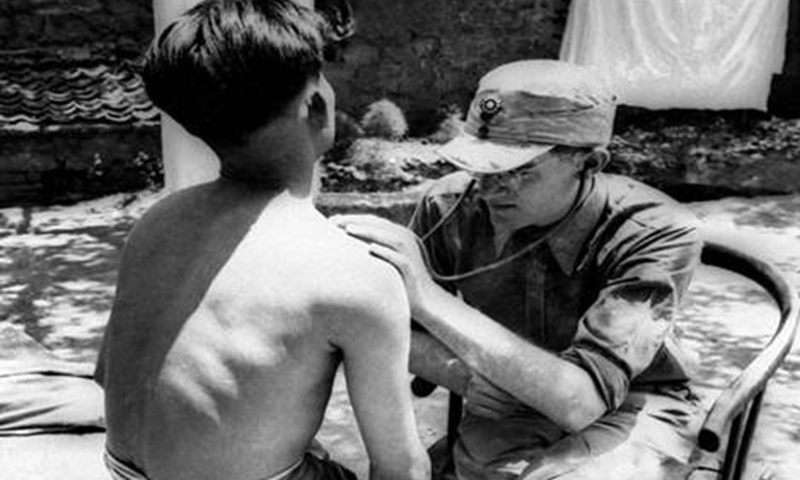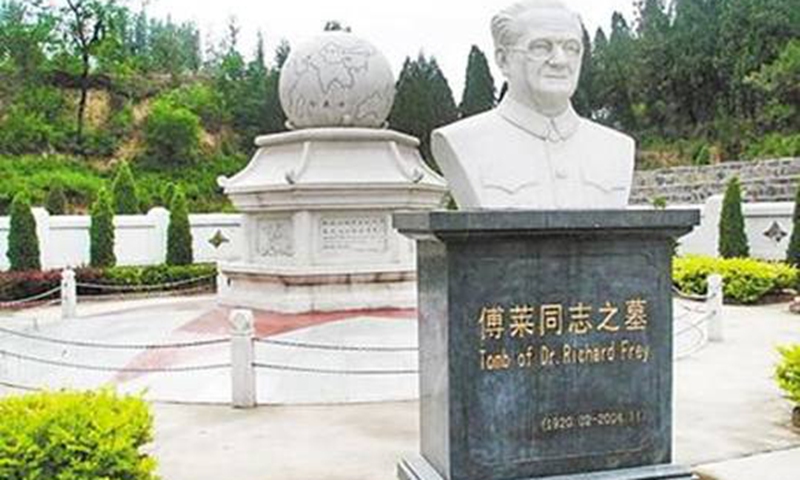Richard Frey: An Outstanding Doctor from the Riverbank of the Danube

Editor's Note: To celebrate the 100th founding anniversary of the Communist Party of China, we are launching the "100 CPC Stories in 100 Days" series, featuring foreigners who witnessed and participated in the CPC's history and helped the world better understand the CPC. The following is the 51st story of the series.
In the Jin-Cha-Ji Martyrs' Cemetery, Tangxian County, there was the tomb of Richard Frey, an Austrian doctor who devoted his entire life to the Chinese people's fight against Japanese aggression, the liberation of China and development of the People's Republic of China. In the 65 years when he lived and worked in China, he witnessed the victory of the Chinese people's war of resistance against Japanese aggression and the founding of the People's Republic of China, and contributed to the country's development, reform and opening-up. People in China affectionately called him the outstanding doctor from the riverbank of the Danube.
When he was 17, Frey secretly joined the Communist Party of Austria and was hunted by the Nazis for his active involvement in underground anti-fascist activities. Despite being far away from China, Frey had long heard about the fight against Japanese aggression of the Communist Party of China (CPC), and believed that the CPC shared his commitment and pursuit, so he decided to go to China notwithstanding the long journey. On January 15, 1939, after a 28-day voyage, the 19-year-old Austrian doctor finally arrived in China. Frey first went to Shanghai, and then to Beijing and Tianjin to look for local CPC organizations. Finally he got a message from Nie Rongzhen, commander of the Shanxi-Chahar-Hebei military area, welcoming him to work in the military area. Frey was thrilled when he received the message, feeling like seeing the light of dawn in the darkness, like an orphan holding his mother's arms again. Not long afterwards, he was escorted by the underground Party members and guerrilla fighters to the Shanxi-Chahar-Hebei base area where he was received by Commander Nie Rongzhen. Frey's original name was Richard Stein. Nie said to him, "Fulai (Frey) sounds like freedom in German and you have come to join the Eighth Route Army in the pursuit of freedom, so this is a very good name." Frey was delighted with his new name and used that name for the rest of his life.
Gratified that he could continue his medical work in China, Frey went to the Norman Bethune Health School with an appointment letter signed by Nie. Life was hard and battles were cruel, but Frey worked at the frontline with full passion for the revolution. He taught at the school, saved soldiers injured on the battlefield, and helped with the military's public health work. On top of all that, he overcame difficulties and actively conducted medical research.

Frey often joined the inspection group sent by the military area's health ministry to visit military sub-areas and combat forces to inspect the public health work. Astonished by the serious lack of medicine in the border area, and encouraged by the news of penicillin, a specific for war wounds and infectious diseases, already being in clinical use in the UK and the US, Frey decided to make penicillin in China. In early 1945, approved by the government of the Shaanxi-Gansu-Ningxia Border Region, Frey and his two assistants built a biochemical lab which was in fact just a small workshop to research on making crude penicillin using raw methods at the then China Medical University located in Liushudian, east of Yan'an. Without thermostatic devices to grow bacteria, they made a mud hut into a lab and built a heated brick bed to keep the temperature constant. Without functional stainless steel fermenters, they used small-necked glass bottles of different sizes instead. Without mixers and shakers, they went in the lab to shake the bottles manually on a regular basis. Without air compressors, they used bike pumps instead. Without air filters, they used bike pumps to get air through a tube stuffed with sterile cotton and filter cloth to get the air sterilized before channeling it into the fermenter to make sure that enough oxygen was dissolved in the culture fluid… After countless failures, Frey and his assistants produced China's first crude penicillin in 1945. That was a great contribution to relieving the lack of medicine faced by our military and particularly to reducing infection caused by wounds.
In 1944, recommended by Nie Rongzhen, Frey's application for CPC membership was approved. Though having the typical face of someone from the West, deep inside, Frey never thought of himself as a foreigner. At the opportunity of the first national census of the People's Republic of China in 1953, he was granted Chinese citizenship after making active efforts in application. Thus, Frey completed the transformation from being international to being Chinese.
In 1961 after his father passed away, Frey paid his first visit home after he left Austria. Frey and his parents loved each other very much and they had kept in touch through letters. At home, his mother hoped that he could stay with her. While many in China thought he would not return, as it was during the time of the three years of economic difficulties, Frey came back to China to their surprise. Frey said that the thought of not returning never crossed his mind because China had become a second home to him and where his career was based. He noted China was underdeveloped compared with some developed Western countries, and the hardships he himself had borne, but said that he as a communist, had much better conditions than ordinary Chinese soldiers and the general public. He said that even in the toughest days of the war, when students at the health school only lived on black beans, teachers like Dwarkanath Kotnis and him had millet and in Yan'an they even had rice and wheat flour. Frey also recalled that for ordinary teachers at the school, two had to share a one-wick oil lamp, while Commander Nie approved that he could have a two-wick oil lamp of his own because of myopia.
On November 16, 2004, Frey passed away due to illness in Beijing at the age of 84. He was a member of the sixth to ninth National Committee of the Chinese People's Political Consultative Conference (CPPCC). And he received several government commendations, including the Medal of Independence and Freedom of the People's Republic of China and Medal of Liberation, and Ministry of Health Scientific Progress Award. According to his will, his body was donated for China's medical research and his tomb was built in Tangxian County where he had fought.

- China confronts senior cancer surge with early detection, TCM
- Expert debunks Lai's 'four elements' argument for Taiwan's so-called statehood
- Tech innovations fuel China's desertification fight
- 4 giant pandas return to China from Japan
- China allocates another 100m yuan to aid flood-hit Guizhou
- HK entrepreneur Ho Tsu-kwok dies at 77






































